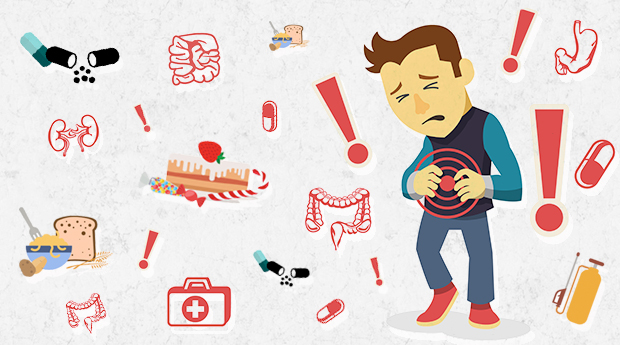Scientists Learn Exactly Why Fiber is Good for You
The term “dietary fiber” refers to the indigestible molecules or compounds of plants that we cannot break down ourselves. Yet the billions of bacteria lining our gut do. In fact, according to recently published studies, they survive on it. And in turn, keep our intestines and immune systems in good working order.
Moreover, the healthy microbes which depend on the fiber in, say for example, the fruits-and-vegetables diet relate directly to how healthy and diverse your gut-biome is exactly. 
In one experiment, scientists put mice on a low-fiber, high-fat diet and by examining fragments of bacterial DNA in the animals’ feces, the scientists were able to estimate the size of the gut bacterial population in each mouse. On a low-fiber diet, they found, the population crashed, shrinking tenfold.
As reported by the NY Times, along with changes to the mice’s microbiome, rapid changes to the mice themselves occurred-their intestines got smaller and healthy mucus thinner. Furthermore, the bacteria wound up much closer to the intestinal wall, and that encroachment triggered a negative immune reaction.
What does this tell us? Just like mice, we will have a better quality of life if we make our goal a high-fiber diet this new year; reducing our risk of developing diabetes, heart disease and arthritis.
Check out another interesting read on the gut and microbiome in our bodies here by NPR.
Food Budget for 2018: Ready to Lose Weight?
Tracking your food intake, much like a financial budget, can help you identify where you might be consuming more than you realize and ultimately, be an effective strategy for shedding extra pounds.
 There are several free digital applications that can help you keep a closer eye on your diet, such as MyPlate or MyFitnessPal. These apps keep track of the calories of meals and snacks you consume throughout the day. According to Dr. Yoni Freedhoff, an obesity medicine clinician, there is a lot of research suggesting that this kind of record-keeping can be a powerful tool for weight-loss. By logging your food intake, you become more aware of, and committed to, changing your behavior. That is, ridding yourself of those late-night cravings and instead, encouraging your self to make healthier decisions.
There are several free digital applications that can help you keep a closer eye on your diet, such as MyPlate or MyFitnessPal. These apps keep track of the calories of meals and snacks you consume throughout the day. According to Dr. Yoni Freedhoff, an obesity medicine clinician, there is a lot of research suggesting that this kind of record-keeping can be a powerful tool for weight-loss. By logging your food intake, you become more aware of, and committed to, changing your behavior. That is, ridding yourself of those late-night cravings and instead, encouraging your self to make healthier decisions.
Roxane Gay, NY times best-selling author of Bad Feminist.
However, for some people who suffer from anxiety due to body-image or an eating disorder, might find this type of calorie counting not helpful. It could trigger or exacerbate their anxiety. Calorie-counting can become an obsessive activity, so be mindful and don’t go overboard! Ultimately, losing weight is about loving yourself, being healthy, and feeling good.
In Hunger, New York Times best-selling author, Roxane Gay, has “written with intimacy and sensitivity about food and bodies, using her own emotional and psychological struggles as a means of exploring our shared anxieties over pleasure, consumption, appearance, and health.”
Governor Cuomo Unveils No Student Goes Hungry Program for 2018
The 15th proposal of the 2018 NY State of the State describes the launch of “a comprehensive program to provide students of all ages, backgrounds and financial situations access to healthy, locally-sourced meals from kindergarten through college.”
As stated in the NY State press release, the proposal includes investments to expand the Farm to School program and legislation which will expand access to free breakfast and extinguish food shaming. Additionally, subsequent policy changes will ensure access to farm-fresh foods as part of the school lunch program and require all SUNY and CUNY campuses to have food pantries on site.
Tyson and Other Big Food Giants Linked to Toxic Site near Gulf of Mexico
“Industrial-scale agriculture to support America’s livestock is the number one source of water pollution in the country. But while industrial agriculture to feed animals raised for meat is currently resource-intensive and ecologically destructive, it doesn’t have to be. Solutions exist which, if adopted, would allow the meat industry and agricultural corporations that sustain it to reduce their impact on water and the planet.” – EcoWatch.com

“There’s nothing average about this!” National Oceanographic and Atmospheric Administration (NOAA) released its annual forecast for the size of the Gulf of Mexico “dead zone“—an area of coastal water where low oxygen is lethal to marine life. – Eco Watch, 2016.
See the Clean It Up, Tyson campaign launched by Mighty Earth in order to hold this industry accountable for the devastation they cause to our communities and the destruction to our planet!
Read the full EcoWatch article here. And just for kicks, check out these listed toxic superfund sites and their respective industry leaders.

Comments are closed.